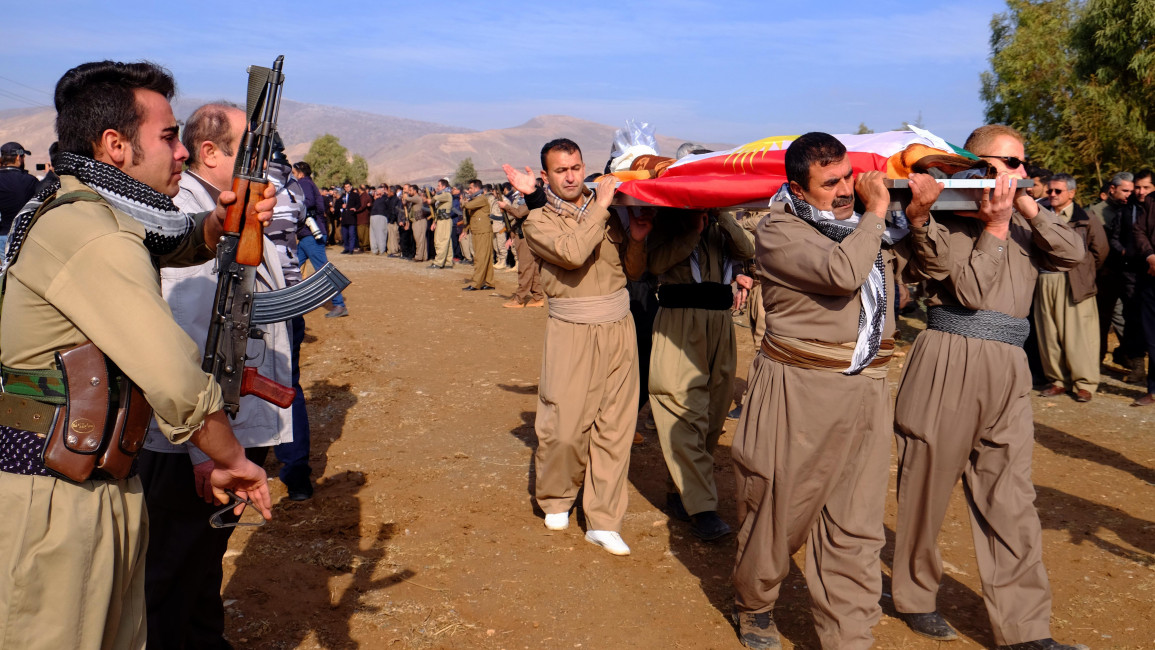Iranian Kurdish opposition parties unite after 16 years
The Kurdistan Democratic Party of Iran (KDPI) and Iran's Kurdistan Democratic Party (KDP-Iran) announced on Sunday their reunification under the name of KDPI and called for close coordination among all Iranian Kurdish opposition groups as a preparation for any "major developments" in Iran.
"The reunification of KDPI will be the start of a new era of this party's struggle against the regime of the Islamic Republic of Iran," read a joint statement from both parties.
"The reunification will be against any centrist mentality that denies Iran's multi-ethnicity and the national rights of different components in Iran. It will pave the way for the national movement in Rojhalat [Iranian Kurdistan] to be such a leading force that in any overall development to be especially counted for," the statement added.
Khalid Wanawsha, a member of KDPI's central committee, told The New Arab via a secure calling application that several factors led to the reunification, including mainly advice by Kurdish political parties and figures in Iraq, Iran, Turkey and Syria, as well as pressure from the two parties' loyalists and families of "martyrs" and prisoners inside Iran's prisons.
We are pleased and proud to announce that the negotiations between the leadership of the KDP and the #PDKI have finally resulted in the unification of the two parties. Congratulations to the people of #Kurdistan! #PDKI pic.twitter.com/457N5VLXYl
— PDKI (@PDKIenglish) August 21, 2022
"According to the reunification agreement, we are now in a transitional period from six to one year. A 12-member council, six members from the previous two wings, will lead the party until we organise the party's congress," Wanawsha said.
"Accordingly, Mustafa Hijri, will run the party's administration and Khalid Azizi will be the head of the party's foreign relations, as well as spokesperson until the party's congress is held," he added.
The KDPI is an Iranian Kurdish opposition party that has waged an armed rebellion against the Iranian government since the 1979 Islamic revolution. It was founded in Iranian Kurdistan in 1946 by late Kurdish leader Qazi Muhammad, the founder of the first modern Kurdish state of Mahabad.
Wanawsha clarified that the party split into two different parties following its 13th congress in 2006 when the two sides disagreed over the party's leadership.
He stressed that the party currently struggles to achieve the goal of federalism for the Kurdish people in Iran, and they have had many joint meetings with other Iranian opposition parties in Iraq and in exile.
The KDPI official clarified that they have an armed peshmerga force based in the border areas in the Iraqi Kurdistan region with Iran. However, he indicated they are not launching attacks against Iran from the Iraqi Kurdistan region territories, but rather "defend themselves against Iranian assaults."
The Hengaw Organization for Human Rights recently stated that Iran's Islamic Revolutionary Guard Corps (IRGC) has deployed heavy weaponry and troops on border areas between Iran and the Kurdistan region.
Mussa Babakhani, a member of the central committee of the Kurdistan Democratic Party of Iran (KDPI), was killed in a hotel in Erbil. The party accused the Iranian intelligence ministry of carrying out the assassination.
In September 2018, an Iranian missile strike on the KDPI headquarters in Iraq's Kurdish region killed 15 people.
In July 2019, Iran's Revolutionary Guards said they had attacked suspected "terrorists" in Iraqi Kurdistan, killing and wounding several.
Tehran has warned the authorities in Iraqi Kurdistan not to allow Iranian Kurds to set up camps near the border, and to disarm the Iranian Kurdish opposition parties.
Before the party's reunification, Hassan Qadrzadeh, commander of KDP-Iran, said to The New Arab that the IRGC had moved troops near the border with Iraqi Kurdistan, but did not launch cross-border operations into the region.
He said the party neither has a truce with Iran nor is ready to lay down its arms. Yet, he noted, as per calls by the authorities in Iraqi Kurdistan, the organisation has ceased conducting any operations from Iraqi territories against Iranian forces.
Kurds, a non-Arab ethnic group, have long agitated for their own state. They number between 25 million and 35 million people and are spread across Turkey, Syria, Iraq and Iran. In Iran, they make up around 10 per cent of the population.



